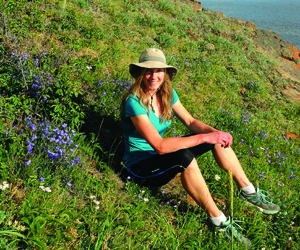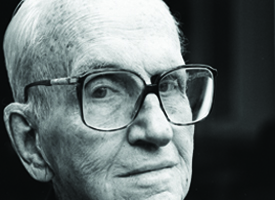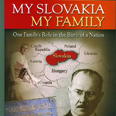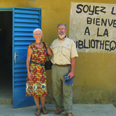By Matt Zencey ’79

In spring 2008, Laura Fox ’03 had one immediate goal: hike the Pacific Crest Trail from Southern Californiaall the way to British Columbia.
As she was preparing to leave Yale Law School, she got a message from the career office. The chief justice of Alaska’s Supreme Court had a last-minute opening for a clerkship that fall.
Two days into her trip, from a campground along the trail, Laura did a phone interview. She got the job.
By late August, she had finished her 2,600-mile journey. After buying a set of work clothes, and arranging for her mom to send more, Laura headed north to Alaska to work for Chief Justice Dana Fabe.
By Robert Strauss

The word “retirement” is just about retired—or maybe taking proverbial Botox treatments to stay vibrant. The idea of buying a condo in Florida and warming up the putter five times a week is so 20th century. Baby Boomers keep dreaming of goals and don’t believe the one-career life is sufficient. Maybe Swarthmore grads, with their grounding in the liberal arts, are even more susceptible. And they don’t have to be 60-something to make a radical career change.
When Kathy Leser ’76 took early retirement in 2002, it was just in time to work at the Winter Olympics—at the curling competitions.
Related Article
By Carrie Compton

On a sweltering July night, Jonah Eaton ’02, wiry and nimble, jaunts up and down the homemade ladder leading to the deck of the gargantuan almost-completed wooden schooner he’s built by hand. The Northeast Philadelphia workshop where The Aramingo awaits her maiden voyage, awash with workbenches and shelves piled high with tools, spills light into the darkened street. Wooden planks and beams of various lengths and widths line the walls, and boxy machines with thick ductwork snake up toward the high ceiling of the former dairy building.
By Sherri Kimmel

Many writers hope their works achieve immortality. James A. Michener ’29 is one writer for whom that outcome seems assured—through his Pulitzer Prize-winning short story collection Tales of the South Pacific, the inspiration for the hit Broadway musical and Oscar-winning film South Pacific.
Through its storyline, South Pacific keeps Michener’s progressive views on racial relations alive and at the same time adds to Swarthmore’s bottom line every time, everywhere, it is staged.
Related Articles
By Carol Brévart-Demm

Aspiring environmental engineer Hayden Dahmm ’15 is a personable young man with a ready laugh and a clear, melodious voice. Blessed with an enviable memory and ace mental computing skills, he’s hardly different from any other Swarthmore student—except for one thing. Dahmm is blind.
Born more than three months premature, direly underweight and with underdeveloped bodies, Dahmm and his twin brother Ethan spent weeks in incubators, being fed pure oxygen under bright lights.

First Collection for the Class of 2017 featured voices from various members of the community—including a student, a professor, and a newly hired dean—who offered encouragement and advice aimed at building a stronger, more diverse, and more inclusive campus community. The following excerpts are edited and adapted from their Sept. 3 presentations.
From Naudia Williams ’14, a political science major from St. Mary, Jamaica:
“It is easy to become so focused on your tight-knit circle of hallmates or soccer teammates that you never get the chance to talk to that awesome girl from Jamaica who is graduating next year. That’s me, by the way!


John Palka ’60 was born in Paris in summer 1939, only two weeks after his mother had escaped from the newly minted Nazi puppet state of Slovakia. A year and a half later, surrounded by Nazi occupiers in rural Normandy, young John and his parents managed to avoid deportation to a concentration camp and, with the help of the French resistance, cross from the occupied zone to Vichy France. Using forged Yugoslav passports, the family traveled from Marseilles across Spain (where John celebrated his second birthday) to Portugal. From Lisbon, now using Czechoslovak passports, they took what was allegedly Pan Am’s last regular commercial flight to New York.
Why would the Nazis have been interested in getting their hands on this Lutheran Slovak family? The short answer, as we learn from My Slovakia, My Family, is that John Palka descended from some extraordinary ancestors, the most famous of whom was his grandfather Milan Hodža (1878–1944), interwar Czechoslovakia’s last prime minister.
By Richard S. Wilson ’73

The first time we encountered Burkina Faso was in 2007—while visiting our son who was there with the Peace Corps. While there, we met Abga, an ecoguide with whom my wife Emily ’72 has since kept up via email (in French, Burkina Faso’s official language) and who adopted her as his mother. When we went back to visit Abga in 2009, as tourists instead of Peace Corps parents, we were again struck by the poverty—it’s among the 10 poorest countries in the world.
As Emily says, her “do-good” gene kicked in during the first visit. Social activism is something for which Swarthmore—with its Quaker heritage—is known.
But it takes a while to really affect some of us—and get us off our duffs. She started looking for organizations to work with in 2007 and found the California-based Friends of African Village Libraries (FAVL).
 In spring 2008, Laura Fox ’03 had one immediate goal: hike the Pacific Crest Trail from Southern Californiaall the way to British Columbia.
As she was preparing to leave Yale Law School, she got a message from the career office. The chief justice of Alaska’s Supreme Court had a last-minute opening for a clerkship that fall.
Two days into her trip, from a campground along the trail, Laura did a phone interview. She got the job.
By late August, she had finished her 2,600-mile journey. After buying a set of work clothes, and arranging for her mom to send more, Laura headed north to Alaska to work for Chief Justice Dana Fabe.
In spring 2008, Laura Fox ’03 had one immediate goal: hike the Pacific Crest Trail from Southern Californiaall the way to British Columbia.
As she was preparing to leave Yale Law School, she got a message from the career office. The chief justice of Alaska’s Supreme Court had a last-minute opening for a clerkship that fall.
Two days into her trip, from a campground along the trail, Laura did a phone interview. She got the job.
By late August, she had finished her 2,600-mile journey. After buying a set of work clothes, and arranging for her mom to send more, Laura headed north to Alaska to work for Chief Justice Dana Fabe.  The word “retirement” is just about retired—or maybe taking proverbial Botox treatments to stay vibrant. The idea of buying a condo in Florida and warming up the putter five times a week is so 20th century. Baby Boomers keep dreaming of goals and don’t believe the one-career life is sufficient. Maybe Swarthmore grads, with their grounding in the liberal arts, are even more susceptible. And they don’t have to be 60-something to make a radical career change.
When Kathy Leser ’76 took early retirement in 2002, it was just in time to work at the Winter Olympics—at the curling competitions.
The word “retirement” is just about retired—or maybe taking proverbial Botox treatments to stay vibrant. The idea of buying a condo in Florida and warming up the putter five times a week is so 20th century. Baby Boomers keep dreaming of goals and don’t believe the one-career life is sufficient. Maybe Swarthmore grads, with their grounding in the liberal arts, are even more susceptible. And they don’t have to be 60-something to make a radical career change.
When Kathy Leser ’76 took early retirement in 2002, it was just in time to work at the Winter Olympics—at the curling competitions.  On a sweltering July night, Jonah Eaton ’02, wiry and nimble, jaunts up and down the homemade ladder leading to the deck of the gargantuan almost-completed wooden schooner he’s built by hand. The Northeast Philadelphia workshop where The Aramingo awaits her maiden voyage, awash with workbenches and shelves piled high with tools, spills light into the darkened street. Wooden planks and beams of various lengths and widths line the walls, and boxy machines with thick ductwork snake up toward the high ceiling of the former dairy building.
On a sweltering July night, Jonah Eaton ’02, wiry and nimble, jaunts up and down the homemade ladder leading to the deck of the gargantuan almost-completed wooden schooner he’s built by hand. The Northeast Philadelphia workshop where The Aramingo awaits her maiden voyage, awash with workbenches and shelves piled high with tools, spills light into the darkened street. Wooden planks and beams of various lengths and widths line the walls, and boxy machines with thick ductwork snake up toward the high ceiling of the former dairy building.
 Many writers hope their works achieve immortality. James A. Michener ’29 is one writer for whom that outcome seems assured—through his Pulitzer Prize-winning short story collection Tales of the South Pacific, the inspiration for the hit Broadway musical and Oscar-winning film South Pacific.
Through its storyline, South Pacific keeps Michener’s progressive views on racial relations alive and at the same time adds to Swarthmore’s bottom line every time, everywhere, it is staged.
Many writers hope their works achieve immortality. James A. Michener ’29 is one writer for whom that outcome seems assured—through his Pulitzer Prize-winning short story collection Tales of the South Pacific, the inspiration for the hit Broadway musical and Oscar-winning film South Pacific.
Through its storyline, South Pacific keeps Michener’s progressive views on racial relations alive and at the same time adds to Swarthmore’s bottom line every time, everywhere, it is staged.  Aspiring environmental engineer Hayden Dahmm ’15 is a personable young man with a ready laugh and a clear, melodious voice. Blessed with an enviable memory and ace mental computing skills, he’s hardly different from any other Swarthmore student—except for one thing. Dahmm is blind.
Born more than three months premature, direly underweight and with underdeveloped bodies, Dahmm and his twin brother Ethan spent weeks in incubators, being fed pure oxygen under bright lights.
Aspiring environmental engineer Hayden Dahmm ’15 is a personable young man with a ready laugh and a clear, melodious voice. Blessed with an enviable memory and ace mental computing skills, he’s hardly different from any other Swarthmore student—except for one thing. Dahmm is blind.
Born more than three months premature, direly underweight and with underdeveloped bodies, Dahmm and his twin brother Ethan spent weeks in incubators, being fed pure oxygen under bright lights.  First Collection for the Class of 2017 featured voices from various members of the community—including a student, a professor, and a newly hired dean—who offered encouragement and advice aimed at building a stronger, more diverse, and more inclusive campus community. The following excerpts are edited and adapted from their Sept. 3 presentations.
From Naudia Williams ’14, a political science major from St. Mary, Jamaica:
“It is easy to become so focused on your tight-knit circle of hallmates or soccer teammates that you never get the chance to talk to that awesome girl from Jamaica who is graduating next year. That’s me, by the way!
First Collection for the Class of 2017 featured voices from various members of the community—including a student, a professor, and a newly hired dean—who offered encouragement and advice aimed at building a stronger, more diverse, and more inclusive campus community. The following excerpts are edited and adapted from their Sept. 3 presentations.
From Naudia Williams ’14, a political science major from St. Mary, Jamaica:
“It is easy to become so focused on your tight-knit circle of hallmates or soccer teammates that you never get the chance to talk to that awesome girl from Jamaica who is graduating next year. That’s me, by the way!

 John Palka ’60 was born in Paris in summer 1939, only two weeks after his mother had escaped from the newly minted Nazi puppet state of Slovakia. A year and a half later, surrounded by Nazi occupiers in rural Normandy, young John and his parents managed to avoid deportation to a concentration camp and, with the help of the French resistance, cross from the occupied zone to Vichy France. Using forged Yugoslav passports, the family traveled from Marseilles across Spain (where John celebrated his second birthday) to Portugal. From Lisbon, now using Czechoslovak passports, they took what was allegedly Pan Am’s last regular commercial flight to New York.
Why would the Nazis have been interested in getting their hands on this Lutheran Slovak family? The short answer, as we learn from My Slovakia, My Family, is that John Palka descended from some extraordinary ancestors, the most famous of whom was his grandfather Milan Hodža (1878–1944), interwar Czechoslovakia’s last prime minister.
John Palka ’60 was born in Paris in summer 1939, only two weeks after his mother had escaped from the newly minted Nazi puppet state of Slovakia. A year and a half later, surrounded by Nazi occupiers in rural Normandy, young John and his parents managed to avoid deportation to a concentration camp and, with the help of the French resistance, cross from the occupied zone to Vichy France. Using forged Yugoslav passports, the family traveled from Marseilles across Spain (where John celebrated his second birthday) to Portugal. From Lisbon, now using Czechoslovak passports, they took what was allegedly Pan Am’s last regular commercial flight to New York.
Why would the Nazis have been interested in getting their hands on this Lutheran Slovak family? The short answer, as we learn from My Slovakia, My Family, is that John Palka descended from some extraordinary ancestors, the most famous of whom was his grandfather Milan Hodža (1878–1944), interwar Czechoslovakia’s last prime minister.
 The first time we encountered Burkina Faso was in 2007—while visiting our son who was there with the Peace Corps. While there, we met Abga, an ecoguide with whom my wife Emily ’72 has since kept up via email (in French, Burkina Faso’s official language) and who adopted her as his mother. When we went back to visit Abga in 2009, as tourists instead of Peace Corps parents, we were again struck by the poverty—it’s among the 10 poorest countries in the world.
As Emily says, her “do-good” gene kicked in during the first visit. Social activism is something for which Swarthmore—with its Quaker heritage—is known.
But it takes a while to really affect some of us—and get us off our duffs. She started looking for organizations to work with in 2007 and found the California-based Friends of African Village Libraries (FAVL).
The first time we encountered Burkina Faso was in 2007—while visiting our son who was there with the Peace Corps. While there, we met Abga, an ecoguide with whom my wife Emily ’72 has since kept up via email (in French, Burkina Faso’s official language) and who adopted her as his mother. When we went back to visit Abga in 2009, as tourists instead of Peace Corps parents, we were again struck by the poverty—it’s among the 10 poorest countries in the world.
As Emily says, her “do-good” gene kicked in during the first visit. Social activism is something for which Swarthmore—with its Quaker heritage—is known.
But it takes a while to really affect some of us—and get us off our duffs. She started looking for organizations to work with in 2007 and found the California-based Friends of African Village Libraries (FAVL).




